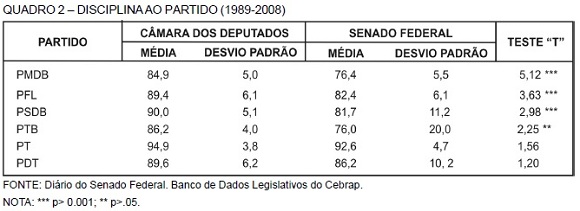This article evaluates political party discipline within the Brazilian legislature and the support that is provided to the government, from the perspective of a bi (dual) chamber system. I have two major objectives.The first one involves including the Senate in discussion of the relationship between Executive and Legislative powers in Brazil, comparing it to the House of Representatives. In the second place, I seek to evaluate parties individually, taking their particular characteristics into consideration rather than regarding them as inherent to the political party system. My analysis has focused on the nominal voting carried out in the House of Representatives and the Federal Senate, in the period ranging from 1989 to 2008, comparing the behavior of one party to another as well as to itself, over time. A cross sectional and longitudinal approach enables us to observe results that were previously unidentified within the literature that deals with the relationship between the nation's Executive and Legislative powers. It also reinforces the argument that parties are cohesive, disciplined and predictable, yet are substantially different from one another in strategies and in terms of the type of relationships that they weave. Given the high level of fragmentation and the peculiar traits of each party, it does not seem appropriate to speak of systemic attributes that can be extended to all of them, and even less so when both seats of power are considered.
Bicameralist System; Federal Senate; Political Parties; Legislative Power







